Adventures In Straw Polls: Fear, Lovecraft, and Me
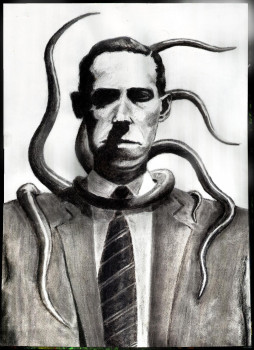 Once upon a time, H.P. Lovecraft, he of the vaunted Cthulhu party set, set down his principles for crafting scary stories. He opined that terror is the oldest and most basic emotion available to humankind, and then went further, stating that those things unknown to we mortals are that which are most fearsome. His exact phrase, from the essay “Supernatural Horror In Literature,” (last revised 1935) reads: “The oldest and strongest emotion of mankind is fear, and the oldest and strongest kind of fear is fear of the unknown.”
Once upon a time, H.P. Lovecraft, he of the vaunted Cthulhu party set, set down his principles for crafting scary stories. He opined that terror is the oldest and most basic emotion available to humankind, and then went further, stating that those things unknown to we mortals are that which are most fearsome. His exact phrase, from the essay “Supernatural Horror In Literature,” (last revised 1935) reads: “The oldest and strongest emotion of mankind is fear, and the oldest and strongest kind of fear is fear of the unknown.”
I disagree.
So far as I can discern, it’s the fear of what is known (or at least readily imagined) that is most terrifying. For example, being wounded and then dismembered by a lunatic straight out of The Texas Chainsaw Massacre or Hostel, or being attacked by a shark while swimming.
Curiously enough, I’m getting set to either torpedo or defend this idea in public. I’ve been asked to be on a panel at April 25th’s Ohioana Book Festival in Columbus, Ohio. The panel topic is “Horror, Suspense, and the Supernatural,” and my fellow panelists include Julie Flanders, Debra Robinson, and all-around horror vet Tim Waggoner, with whom I share a publisher (Samhain).
Some brave audience member is sure to ask “What is horror, anyway?” even though “What isn’t horror?” might make for a better question, and then they’ll move on to asking about how authors scare people. Our tricks and devices. Do we, for example, rely on the known or the unknown to conjure our effects?
Of course, anything outside my direct personal experience could be written off as “unknown,” but Lovecraft truly did have unearthly, cosmic horrors in mind. Such things were unknowable in that his various asymmetrical, tentacled, and shape-shifting invaders emerged quite literally from beyond the ken of daily reality. The usual litany of serial killers, war, famine, disease, and basic vanilla grim reaper death held hardly any interest for him at all.
Here’s H.P. himself, again from “Supernatural Horror In Literature”:
Children will always be afraid of the dark, and men with minds sensitive to hereditary impulse will always tremble at the thought of the hidden and fathomless worlds of strange life which may pulsate in the gulfs beyond the stars, or press hideously upon our own globe in unholy dimensions which only the dead and the moonstruck can glimpse.
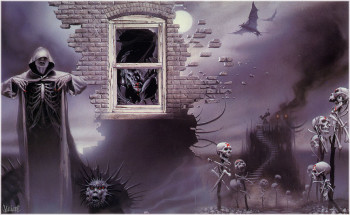 But I submit that at least the majority of what we fear stems from, if not direct experience, “received knowledge” of those earthbound horrors that could, on a wild chance, on a bad day, pluck us up and snuff us out.
But I submit that at least the majority of what we fear stems from, if not direct experience, “received knowledge” of those earthbound horrors that could, on a wild chance, on a bad day, pluck us up and snuff us out.
Exhibit A: serial killers. How many of us have ever met one? Not many, I’m sure. Not many, I hope! And yet this stock character litters the bestseller lists, and movies, and of course television. We are a society obsessed. Each serial killer may be different in individual habit, but their tropes–their gory effects–are forever the same, and so we have a pretty fair idea of what might befall us were we to fall into their clutches. I submit that it’s this “knowability,” the dread chance that one might encounter the exact fate already described in a favorite book or show, that drives most people’s basic sense of fear.
So here I stand, posturing gamely, and oh-so-certain that Lovecraft is wrong, wrong, wrong.
On the other hand, if I step back and examine my own work, beginning with Check-Out Time (Samhain, 2014) or its upcoming sequel, Bonesy (due later this year), I’m not so sure that I practice what I preach––or that I believe it. Check-Out Time relies for its effects quite explicitly on conjuring an old hotel (plus its many former guests) that refuses to accept its own demolition. In attempting to return to the corporeal world, the building and its denizens do not adhere to the normal laws of nature, and neither does the sewage creature Coil, a semi-sentient flow of swamp water that winds up pursuing one of my two semi-super supernatural sleuths.
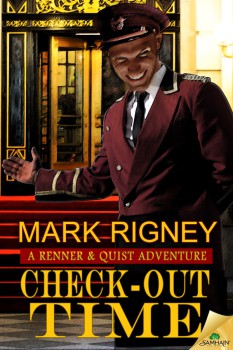 Here’s what Lovecraft might have to say about this:
Here’s what Lovecraft might have to say about this:
A certain atmosphere of breathless and unexplainable dread of outer, unknown forces must be present; and there must be a hint, expressed with a seriousness and portentousness becoming its subject, of that most terrible conception of the human brain — a malign and particular suspension or defeat of those fixed laws of Nature which are our only safeguard against the assaults of chaos and… unplumbed space.
So once again, my fictions, for Lovecraft, remain essentially mundane. The final resting place of my particular supernatural work is not set in the “outer” depths of “unplumbed space.”
Guilty as charged, I suppose, although once again, I find myself rebelling against Lovecraft’s limiting dictums about what constitutes ultimate terror. I don’t dispute that his criteria were true for himself, but for the rest of us? His brand of horror fiction, while widely admired and frequently imitated, is a drop in the bucket–no, in the ocean–of fictions and films that deal in scares and fright of various other types. Does this not in itself suggest he had it wrong?
And thus we arrive at the straw poll portion of the program. What do you find frightening? Do you feel that Lovecraft’s argument is compelling? Or is it the everyday, the normal, or at least the left turn where normality shifts into something more vengefully dangerous, that causes the hairs on your arm to rise?
Weigh in, please!
And if you’re in central Ohio on April 25th, stop by and introduce yourself.
Onward.
Mark Rigney has published three stories in the Black Gate Online Fiction library: ”The Trade,” “The Find,” and “The Keystone.” Tangent called the tales “Reminiscent of the old sword & sorcery classics… once I started reading, I couldn’t stop. I highly recommend the complete trilogy.” In other work, Rigney is the author of “The Skates,” and its haunted sequels, “Sleeping Bear,” and Check-Out Time. A new novel, Bonesy, will be released Sept. 1, 2015. His website is markrigney.net.
 |
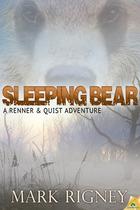 |
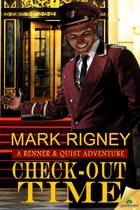 |
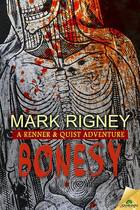 |
Fear of the unknown is a strong fear, so strong as to challenge sanity itself. I think Lovecraft is 100% right on that one. If we see something beyond our ability to comprehend it can be so frightening as to be maddening.
One might have heard the tales of the “Hellfire Club” – bunch of Rich Elites playing devil games, more out to summon Priapus than anything supernatural. One member a “Noveau Riche” man in there for the social/business contacts had the gall to pull a prank. During their “Black Mass” he opened a box he’d planted there earlier with a string and out popped a Mandrill! Now, this was the 1700s, very few had traveled more than 30 miles from their home and apes though intellectually heard of none had seen any, moreso the “Blue Nose Baboon”… It was thus something so outside what they’d known or encountered it might as well have been… Could it beee….?
The critter grabbed none other than the High Magus, the Earl of Sandwich… (credited with guess what?) At the top of his lungs he screeched “Oh, please my Dark Lord S….!!! Why do you seize me? Surely there are others in the audience more deserving of your punishment?” – while the audience left like a bat out of … Decimated the club. Lost maybe 1/3 the members who soon donated heavily to the church and re-affirmed their faith. I presume the nearest minister got a fright as many naked people wearing goat masks and other occult junk burst in, likely fearing he was a victim of “The Wild Hunt” but then they were praying and begging him to help them! H… had been literally scared out of them!
Now, if it was a story I’d written I’d have the Magus go to the guy that played the prank and go “Lead us on, for now you are Magus, and from one wonder to another with us eagerly behind you and Damn anyone who calls for respite…!” – but it was RL and they blackballed him from the club…angry at the indignity of the prank, the whining adult babies they were.
Another proof is the off again/on again “Reality” show “Scare Tactics” that is a liability/lawsuit nightmare. When people see things that are fantastic for real, boy to they climb the walls. “Monkey with a Gun!” – guy climbs a 30 foot fence in a second. Alien comes in Piece – as in Pieces of Human Flesh it starts biting off the car driver, a lady in a minidress and skimpy heels runs for 3 miles at Olympic record pace over desert and cactus….
There are a lot of other types of fear, bodily harm, uncertainty in succeeding/surviving, attack… But a ‘supernatural’ fear is something we don’t see every day – if for instance Vampires were real and provable (on the news dealing with ‘hate speech stereotypes’ on them, the Church weighing in…) Or, there was a proven alien base with working Anti-Grav and cloaking that probed humans and cut up cows – well it’d become a natural fear. Encountering something seen as truly supernatural is an overwhelming experience.
I’ll vote with Lovecraft on this one.
We are afraid of the dark.
As to your example of the fear of sharks, Jaws is scariest when he’s invisible! He’s much less scary once he starts climbing on board the Orca and so forth.
Mark,
I think what you’re overlooking in your premise here is that there are two kinds of fear, and you’re conflating them.
With fear of the known, you’re talking about fear of that which can do us bodily harm: “For example, being wounded and then dismembered by a lunatic straight out of The Texas Chainsaw Massacre or Hostel, or being attacked by a shark while swimming.” That is one kind of fear — fear of what can happen to our body and the accompanying pain — and that fear can be emotionally and physiologically overwhelming.
Lovecraft’s fear of the unknown touches on the fear that something might completely overturn our conception of what is real or natural.
C.S. Lewis drew a strong distinction between the two types of fear in one of his essays on storytelling. If all we were after was strictly terror, he argued, well then why write a story about a ghost in the house when you can write a story about a burglar breaking into the house? A spectre or an apparition might not even have any physical capacity to harm us at all; pragmatically speaking a burglar is far more physically threatening. But a burglar fits into the world we know and understand, whereas a paranormal manifestation does not (at least not if we hold a fairly modern, naturalistic worldview).
Practically speaking, a serial killer trolling the neighborhood or a shark trolling the waters is more “frightening” because they exist and they fit into the natural world that we know. A zombie wandering down the street is, by this yardstick, not scary at all because it does not exist. But if we can suspend disbelief for long enough to imagine a dead corpse somehow imbued with kinetic energy, dead limbs moving, cold tissue jerking forward in an unnatural pantomime of life, that is horror because it would so violate the natural order we think we know: dead things do not walk.
And our minds like to categorize and define and understand. Oh, you got a vampire? Let in the sunlight and stock up on wooden stakes. Werewolf? Start hoarding the silver. Zombie? Aim for the head. And so on. The analytical part of our mind is always trying to render the unknown into the known.
Stephen King addressed this in his seminal book Danse Macabre: he made the distinction between terror — what you’re talking about — and horror, or Lovecraft’s fear of the unknown. And for the latter, he posited that opening the closet door just a crack — just giving a peek — can be more effective than throwing the door open wide. Because as soon as we see the terror, as terrifying as it might be, we then know it and can start to define and tame it, “wrap our heads” around it. Throw open the door and reveal a man-sized cockroach? “Well,” the reader breathes a sigh of relief, “At least it wasn’t a ten-foot-tall cockroach.” Okay, it’s a ten-foot-tall cockroach! “At least it wasn’t a twenty-foot-cockroach.” And so on.
Fear of the unknown, as Lovecraft means it, is not just the idea that we hear a scraping sound at the cave entrance and we don’t know what’s making the sound. Homicidal maniac? Tiger? Thief? It suggests there is another fear apart from all those possibilities: that what is out there might be Something Else. Something that doesn’t fit any of our known categories. Those categories, threatening as they might be, we have some concept of and can try to understand or anticipate or adapt to and deal with.
Something Else may not threaten more physical harm to us than the claws of a tiger or the knife of a killer — maimed or dead is maimed or dead — but It might completely shred our whole conception of what reality is outside that cave.
Tapping into that kind of fear plays on our primal suspicion that there are things to be feared in the Darkness that not even the most veteran ambulance driver or homicide detective could be prepared for. Things our ancestors feared (and that we feared as children) that cannot be fended off with a spear or a trap. Things that might not leave so much as a scratch on our body, but still leave our mind in tatters.
Excellent points, one and all.
So far I’m down 0 – 3.
But I admit to hoping for more responses. The straw poll is still open, after all.
Plus, I’m now up for a Hugo for “Essay That Drew the Longest Responses.”
: )
Outside of literature, many have noted that in horror movies what you don’t see is much scarier than what is explicitly portrayed. Personally I find this to be true. My mind tends to cook up (or at least suspect much worse) something much more horrible when the horror is hinted at or glimpsed. Once we see the horror in its full clarity (if it can be “seen”), I think our mind begins to cope with it and it becomes less horrific, at least in some sense.
Sorry, I’m with Lovecraft on this one.
I live in Columbus, so I usually hit the Ohioana Book Festival when it comes to town. I might stop by.
I’m hardly a seasoned reader of classic horror, but I have been slowly making my way through the complete works of H.P. Lovecraft over the past year, and I would like to share my thoughts as a relative layman in this field.
First, I’ve deeply enjoyed Lovecraft’s fiction, especially now that I am getting to his novella years in which he wrote some of his most famous works. He had a boundless imagination, a dark sense of poetry, a knack for building atmosphere, and…a boundless imagination. Seriously, his imagination is worth listing twice because his ideas were just SO DANG COOL! He plowed into uncharted creative territory with a vengeance and left us with a body of work that is still fresh and unique.
However, I hardly ever find him scary.
This might be because I already had some pop-culture knowledge of Lovecraft and the Cthulhu mythos, but I also been reading these stories to my wife, who had no such prior knowledge. She doesn’t find them very scary either. I have a few thoughts on why this might the case.
Although “fear of the unknown” is good in theory, it is incredibly difficult to execute with success. Even Lovecraft had trouble consistently pulling it off. Done well, it builds up a sense of looming mystery and dread; simultaneously repulsing me and drawing me in. Done poorly, it often leaves me feeling unsatisfied, like the the author might as well have written “imagine a scary thing here.” I’ve read a lot of self-consciously Lovecraftian works that fall in the latter category.
Even in the stories I have read that effectively prey on the fear of the unknown, I think there is a little more at play. I posit that the scariest kind of horror is built on the border between the known and the unknown. This might be why the haunted house is still such an awesome horror archetype. A house is a home. It is a familiar place. Even if the house in question is not ours, we understand what a house is and what it feels like. Then, when the house yields macabre secrets or becomes the focus of supernatural attack, the dissonance between known and unknown creates fear. This is also why ghosts remain such an effective archetype, as they too embody the dissonance between the known and the unknown.
And, frankly, those classic ghost stories scare me far more than ultimately unknown cosmic horrors, because I understand ghosts just enough for them to truly frighten me.
I do agree that in visual terms, the unseen is far more frightening than the fully seen.
I’m not convinced that’s really what Lovecraft is talking about, but then again…
I also agree that the mind adapts rapidly, and that anything once outside its experience can, if you survive the encounter, be quickly categorized and normalized.
0 and 4!
James, I’ll keep an eye out for you.
Onward, and thanks to all for reading.
Adam – only just spotted your comment. Yes, interstitial spaces are required for most horrors/terrors. If we don’t have the mediating effects of language, for example, we wouldn’t be able to set down an encounter with “the unknown” in the first place.
One thing working against Lovecraft fright-wise is his legendary purple prose. I’ve read his work aloud around campfires late at night with nightjars calling all around (spooky, spooky) and whatever chills my friends and I felt were regularly interrupted by gales of laughter deriving from the prose itself.
Happy reading one and all!
So basically, Lovecraft was predicting the Total Perspective Vortex.
“The man who invented the Total Perspective Vortex did so basically in order to annoy his wife.
[…]
“‘Have some sense of proportion!’ she would say, sometimes as often as thirty-eight times in a single day.
And so he built the Total Perspective Vortex — just to show her.
And into one end he plugged the whole of reality as extrapolated from a piece of fairy cake, and into the other end he plugged his wife: so that when he turned it on she saw in one instant the whole infinity of creation and herself in relation to it.
“To Trin Tragula’s horror, the shock completely annihilated her brain; but to his satisfaction he realized that he had proved conclusively that if life is going to exist in a Universe of this size, then the one thing it cannot afford to have is a sense of proportion.”
What I tend to fear most in general is the Kafkaesque situation of losing control of one’s life to a system you don’t fully understand. I’m not sure if this counts as a known or unknown horror; it’s probably a bit of both.
I agree with you. If it’s something beyond our imagination, I don’t think it would be very scary because fear is rooted in the imagination. An example is a totally blackened room. Is there a big hole I can fall into? Are there rats etc.? Is there a way out of here? And all those thoughts are manifested in the imagination. I spent a number of hours in various isolation (sensory deprivation) tanks while I was working for John Lilly in the 70’s. The first time I went into a tank, he opened the door and said there is nothing in there except what you yourself bring in. I found those words very helpful many times.
HPL thought of cosmic horrors beyond the ken of most people but if he could imagine them, then they were scary to him. Can the situation of an unknown entity doing something unknown be scary? I don’t believe it can. Either the entity or the action has to be familiar in some way in order to work. Otherwise, what is there to fear? Even themes of unknown beings/entities that do something known are difficult because the entity would have to remain indescribable and the actions would appear as random acts of violence. Although it’s possible to have some kind of cool sound or color be an indication of a coming act of horror.
Probably the theme used most frequently is the known entity with unknown properties. In “The Large Ant” (The Edge of Tomorrow, Howard Fast) a man sees a large ant sitting on the edge of his bed. His first reaction is to grab a golf club and instantly kill it. As the story unfolds, it is revealed at least eight other ants like it—14-15 inches long—have been found and all were killed. Later he admits to scientists interviewing him that he was “scared to death.”
Serial killers I think fall into the category known entity with knowable and scary results (and you can fill in the method of killing). The octopus in 20,000 Leagues Under the Sea is another example of this.
As for what scares me? I’ve sat through many horror movies with my eyes and ears covered, peeking through my fingers but the worse shock of all was in The Thing From Another Planet (1951) when the AF crew went looking for the alien in the greenhouse. I was very young and the dread/fear as they walked down that corridor was so intense I had to see the movie four or five times before I was able to keep my eyes open and finally see what happened when they opened the door. I saw it at second and third run movie theaters and in the years before it played on TV, the uncut version showed the bodies hanging from the rafters in the background.
A really thought provoking article on the subject, Mark. Thanks for doing this.
Barb
Joe – Yep, proportion über alles.
Solitair – Kafka, being one of the few writers to whom we append an “esque” without a second thought, was surely on to something vital. Loss of control…petrifying.
Barbara – Thanks! Thanks to you having weighed in, I didn’t post a shut-out.
Happy reading, one and all.